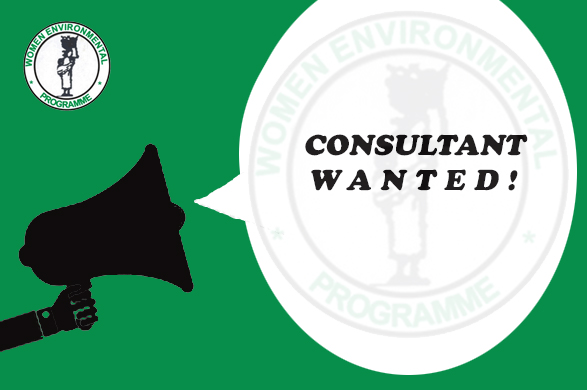
CALL FOR APPLICATIONS: CONSULTANCY FOR BASELINE SURVEY ON IMPACT OF SMALL SCALE CROSS BORDER TRADE ON WOMEN’S ECONOMIC EMPOWERMENT
DEADLINE EXTENTION: The deadline for applications has been extended to February 26, 2020.
CONSULTANCY FOR BASELINE SURVEY ON IMPACT OF SMALL SCALE CROSS BORDER TRADE ON WOMEN’S ECONOMIC EMPOWERMENT.
WEP is a non-governmental, non-profit, non-religious and voluntary organization whose vision is to see a society where the environmental, economic and political rights of women, children and youths are protected. Our mission is to empower women and youths to effectively address the environmental, economic and political issues that affect them. WEP has United Nations ECOSOC Special Status, Observer Status to the United Nations Environment Programme (UNEP) Governing Council/Global Ministerial Environment Forum and United Nations Framework Convention on Climate Change (UNFCCC). With the Observer Status, WEP can participate as a major group organization in contributing to the intergovernmental decision making process in the UN-System.
LOCATION:
Nigerian/Niger Border
PROJECT BACKGROUND:
Small-Scale Cross-Border Trade (SSCBT) is often neglected in the discussions on African trade policies, although remains an imperative to local economic growth. The operation of small scale trade cross border trade within the Sub-African region has been timeless sustaining economic resilience of many households. In a context of feminisation of economic opportunities, SSCBT is often considered as offering employment and income opportunities to women traders. Therefore, SSCBT plays a vital role in achieving the Sustainable Development Goals (Goal 2 and 5) although still limited, increasing attention is being paid by policy makers to this sector. Despite the seeming importance of these activities to regional trade, national economic development, poverty alleviation, the organization of regional markets and regional integration it remains a significantly under-acknowledged and under-researched area in West Africa particularly in Nigeria-Niger corridor.
Women comprise a significant proportion of people active in this trade and the trade provides specific empowerment opportunities for women; it contributes to the development of informal and formal sector retail markets; it provides employment opportunities to traders and their employees; for those with access to some capital it provides a significant opportunity for poverty alleviation. Despite the importance of this issue, and the development of the ICBT in the aftermath of the 1980s economic crisis, the situation of women and men cross-border traders has received little empirical attention in the central Africa region. In a 2012 AFDB Economic Brief, women’s engagement in Small Scale cross-border trade is a source of income to 43% of the African population and contributes about 30 to 40 % between countries in the Southern African region. Yet Women experience constraints such as higher transaction costs; lack of access to information on procedures, rights, and processes; and limited access to transportation. Furthermore, lack of physical security at border crossings increases the vulnerability of female informal cross-border traders to harassment and different forms of gender based violence.
While poverty disproportionately affects women, international trade has created new opportunities for women by empowering them and assisting them in dealing with poverty. However, there is limited information on the exact nature of barriers that women face in conducting cross border trade encounter.
The aforementioned elucidates the importance of conducting a study to understand the barriers to women’s growth and economic empowerment in cross-border trade. The baseline study is an activity under the project Promoting Women’s Socio-economic Rights (POSER), funded by African Women Development Fund. It is expected that the results would inform the design and implementation of effective policy and legal reforms and program interventions that maximize the gains from trade to empower women.
OVERALL OBJECTIVES:
The objective of this assignment is to protect the human rights of women small scale traders through sensitization on gender based violence; mainstreaming gender into national and regional trade policies through advocacy and promote women’s access to financial support through sensitization and advocacy. Specifically, the study will identify what needs to change and how to achieve the change? Would the change affect women and men differently in cross border trade? What is the current condition of women SCCBT? What are the existing national and sub-regional trade regulatory frameworks including those that support women traders? Are the trade regulatory frameworks gender sensitive? What are the key barriers faced by women and men in undertaking cross border trade? What are the institutional mechanism put in place to monitor the implementation of trade regulatory frameworks?
SCOPE OF WORK:
The consultant supervised by the Program Manger will design the research methodology and conduct a survey on the Impact of Small Scale Cross Border Trade on Women’s Economic Empowerment.
Roles and Responsibilities
The consultant is expected to undertake the following:
- Conduct a desk review of existing literature and studies to determine the conditions of small scale cross border traders, challenges encountered by women and men in cross border trade; existing sub- regional trade related regulatory frameworks; the capacity of the Government to monitor, evaluate and enforce trade policies and laws.
- Design a survey instrument that captures the effects of conflicts on women’s cross border trade activities, key barriers faced by women and men traders in undertaking cross border trade
- Design and pre-test questionnaire;
- Debrief/discuss with the project team about the effectiveness of the questionnaire, checklists and other tools used in pre-test. Collect feedback and finalize them;
- Conduct training and supervise enumerators
- Carryout fieldwork together with the enumerators
- Ensure quality of information collected from the field, cross check with the validity of information collected and verify/revise where needed;
- Data entry, translation (English and \French) and analysis of baseline data collection;
- Update progress of the survey to WEP’s Programme team;
- Presentation of major findings to WEP and collect feedback;
- Prepare the final report incorporating feedback, suggestions and submission of the final report (a compiled version of the report – both hard copy and electronic version in word format) by the date given.
TIMELINE
The assignment will be undertaken for the period of two (2) month after signing of the contract
EXPERIENCE AND QUALIFICATION:
Education
Masters’ Degree in Economics, Public Administration Gender studies, International Trade Social Sciences, and other relevant fields.
Experience
At least 5 years of working and research experience in trade including those of customs administration and other border agencies as well as the private sector;
Excellent experience in economic empowerment issues, including working with financial institutions. Proven experience in gender analysis and women’s empowerment.
Language Requirements
Fluency in English (written and spoken). Knowledge of French and Hausa will be an asset.
APPLICATION INFORMATION:
Interested applicants should send their applications/proposals indicating clearly in the subject line of the email the position being applied for (in Caps E.g. CONSULTANT FOR BASELINE SURVEY) to: wep2002@hotmail.com or info@wepnigeria.net
All applications should be sent in on or before February 14, 2020
Applications should include the following:
- Proposed methodology, activity plan/work plan, and sampling framework.
- Previous demonstrated experience on similar consultancies.
- At least two references.
Female candidates are highly encouraged to apply.


